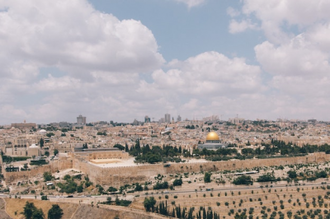Holy Land: Plan to encompass holy sites in national park halted

Mount of Olives - by Robert Bye on Unsplash
Source: Fides/Times of Israel/LPJ
'Brutal' plans to enclose Christian holy sites on Jerusalem's Mount of Olives in a national park have been halted, following major protests from church leaders.
The Nature and Parks Authority of Israel announced today, (Monday 21 February) that it is backing down from 'Plan 101-674788', which had not been publicised. The project would have seen the borders of the Jerusalem Walls National Park extended to include a large section of the Mount of Olives, along with additional parts of the Kidron and Ben Hinnom Valleys.
Spokespersons from the INPA said the project only intended to safeguard the natural and historical heritage of the area from an environmental point of view, and would not formally affect the property rights of private individuals or church entities that own the land.
The Plan, promoted by the Israeli Authority for Parks and Nature (INPA), was due to be presented to the Jerusalem municipality's Local Planning and Construction Committee for preliminary approval on 2 March.
On Friday, 18 February, the Greek Orthodox Patriarch of Jerusalem Theopolis III, Catholic Church Custos of the Holy Land Francesco Patton and Armenian Patriarch of Jerusalem Nourhan Manougian wrote a joint letter to Environmental Protection Minister Tamar Zandberg, whose office oversees the INPA, urging her to take steps to get the planned expansion shelved.
"Although the plan is officially presented by the INPA" - the letter, published by online newspaper The Times of Israel reads - "it seems that it was put forward and is being orchestrated, advanced and promoted by entities whose apparent sole purpose is to confiscate and nationalise one of the holiest sites for Christianity and alter its nature."
Describing the plans as 'brutal" the letter says: "Under the guise of protecting green spaces, the plan appears to serve an ideological agenda that denies the status and rights of Christians in Jerusalem."
The church leaders also sent the letter to the Jerusalem consuls general of France, Turkey, Italy, Greece, Spain, the UK, Belgium and Sweden.
The Jerusalem Walls National Park - according to The Times of Israel - opened in the 1970s. When the state moved to draw the borders for the project, it carefully avoided including much of the Mount of Olives where over a dozen historical Christian holy sites are located, including the Bridgettine Sisters Monastery, the Church of Viri Galilaei, the Grotto of Gethsemane and the Garden of the Apostles. At that time, the authorities had already considered a "phase two" of the project, aimed at expanding the National Park, but that option was shelved at the time so as not to arouse predictable reactions, given the peculiar nature of the area it was intended to incorporate. More than five decades later, the expansion project is now being revived, while members of anti-government groups in Israel suspect it is intended to gradually reduce the Palestinian presence in the disputed areas of East Jerusalem. According to these analysts, the plan to expand the national park is also part of a broader nationalist strategy to "encircle" the Old City of Jerusalem.
Shortly after the church leaders letters were issued, the Nature and Parks Authority said it was freezing the plan. The authority said it has "no intention of advancing the plan in the planning committee and it is not ready for discussion without coordination and communication with all relevant officials, including the churches, in the area."
In a joint statement, Israel rights groups Bimkom, Emek Shaveh, Ir Amim and Peace Now said the plan to extend the Jerusalem Walls National Park to include sections of the Mount of Olives was part of "various mechanisms used by Israel in east Jerusalem to entrench its sovereignty, to marginalise non-Jewish presence and to prevent much needed development of Palestinian neighbourhoods hereby increasing the pressure to push them out of the Old City basin."
Israel captured East Jerusalem and its Jewish, Christian and Muslim holy sites from Jordan, in the 1967 war. The annexation has not been recognised by most of the international community.


















